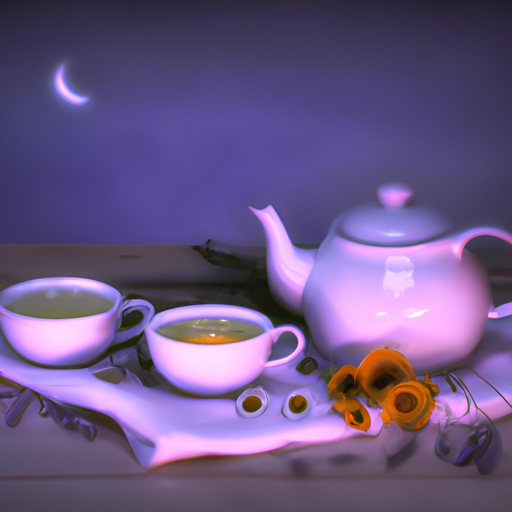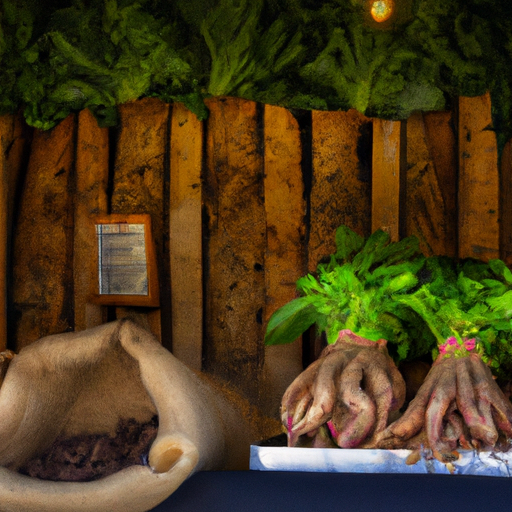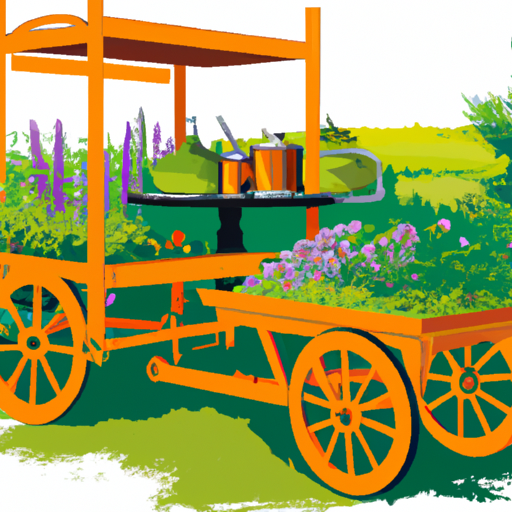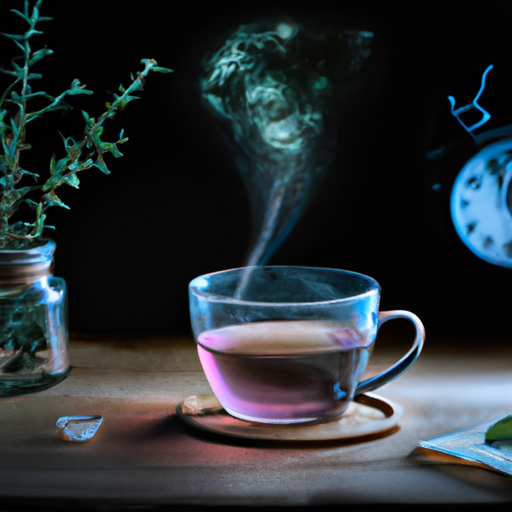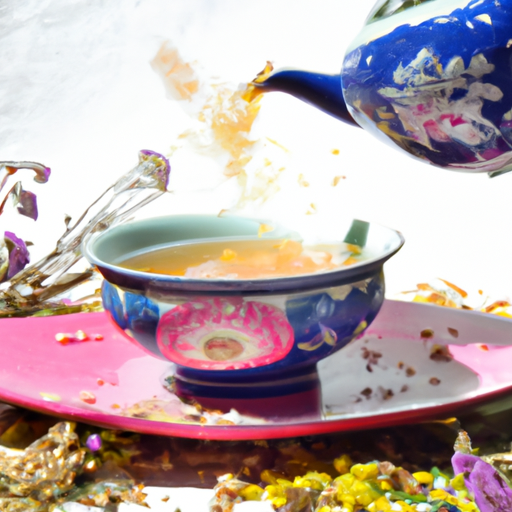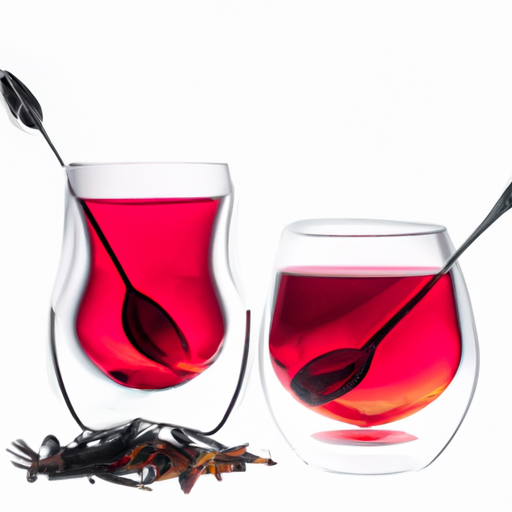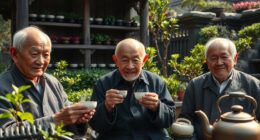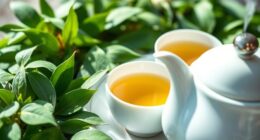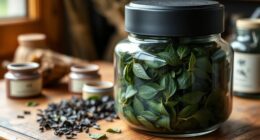Have you ever struggled to fall asleep? I know I have. It can be incredibly frustrating, lying in bed, tossing and turning, as the minutes tick by. But fear not, because I have discovered a natural solution that may just be the answer to your sleepless nights: herbal tea. Yes, that’s right, a warm and comforting cup of tea could be the key to a peaceful slumber.
In this article, I will guide you through the world of herbal teas and highlight the ones that are particularly beneficial for insomnia. Chamomile tea, lavender tea, valerian root tea, peppermint tea, lemon balm tea, passionflower tea, magnolia bark tea, and hops tea have all been found to have calming properties that can help relax the mind and body.
So, grab your favorite mug and join me on this herbal journey towards a good night’s sleep.
Key Takeaways
- Chamomile tea is effective in reducing anxiety and improving sleep quality. It contains compounds that promote relaxation and reduce stress levels.
- Lavender tea is known for its stress-reducing properties and its ability to enhance sleep quality.
- Passionflower tea helps calm the nervous system and improves sleep quality.
- Magnolia bark tea is beneficial for reducing stress and anxiety, promoting relaxation, and enhancing sleep quality.
Chamomile Tea
If you’re struggling to fall asleep and need a natural remedy, chamomile tea is the perfect choice to calm your mind and lull you into a peaceful slumber.
Chamomile tea has been used for centuries for its numerous health benefits, including its ability to promote relaxation and reduce anxiety. It contains compounds like apigenin, which binds to certain receptors in the brain and induces a sedative effect.
To experience the benefits of chamomile tea, it’s recommended to drink one cup about 30 minutes before bedtime. However, it’s essential to note that individual responses may vary, and it’s best to start with a lower dosage and gradually increase if needed.
Now, let’s explore another herbal tea that can also aid in improving your sleep quality – lavender tea.
Lavender Tea
Lavender tea, known for its soothing properties, has been found to promote restful sleep. Here are four reasons why lavender tea is a great choice for combating insomnia:
-
Relaxation: The calming aroma of lavender tea can help reduce anxiety and induce a sense of relaxation, making it easier to fall asleep.
-
Improved Sleep Quality: Drinking lavender tea before bed has been shown to enhance sleep quality, leading to a more restful night’s sleep.
-
Stress Relief: Lavender tea can help alleviate stress and tension, allowing the mind and body to unwind and prepare for sleep.
-
Natural Remedy: Unlike prescription sleep aids, lavender tea is a natural remedy for insomnia that doesn’t come with unwanted side effects.
To make lavender tea, steep 2 teaspoons of dried lavender flowers in hot water for 5-10 minutes. Strain and enjoy before bedtime.
Now, let’s explore the benefits of valerian root tea.
Valerian Root Tea
Valerian Root Tea acts as a natural sedative, helping to calm the nervous system and promote relaxation. It’s been used for centuries to reduce symptoms of insomnia, such as difficulty falling asleep or staying asleep throughout the night.
This herbal remedy is known to promote deep sleep, allowing for a more restful and rejuvenating night’s rest.
Acts as a Natural Sedative
Imagine yourself floating on a gentle stream, carried away by the soothing currents of chamomile herbal tea, which acts as a natural sedative to lull you into a peaceful slumber.
This aromatic tea has been used for centuries as one of nature’s remedies for insomnia, making it a popular choice in alternative medicine. Chamomile tea contains compounds that bind to certain receptors in the brain, promoting relaxation and reducing anxiety. As a result, it can help you fall asleep faster and enjoy a deeper, more restful sleep.
Additionally, chamomile tea has anti-inflammatory properties that can alleviate symptoms often associated with insomnia, such as restlessness and muscle tension. By incorporating chamomile tea into your bedtime routine, you can experience the benefits of reduced insomnia symptoms and promote a more rejuvenating sleep.
Reduces Insomnia Symptoms and Promotes Deep Sleep
Picture yourself drifting off into a blissful slumber, as chamomile works its magic to alleviate symptoms and promote a deep, restorative sleep. When it comes to reducing insomnia symptoms, natural remedies for insomnia such as chamomile tea have been used for centuries. This gentle herbal tea is well-known for its calming properties, thanks to the presence of compounds like apigenin. Apigenin binds to specific receptors in the brain, reducing anxiety and initiating a sense of tranquility that aids in falling asleep faster. Studies have shown that chamomile tea not only improves sleep quality but also reduces the time it takes to fall asleep. So, if you are seeking a natural solution to your sleepless nights, chamomile tea might be just what you need. Now, let’s explore another herbal tea that can help with insomnia – peppermint tea.
Peppermint Tea
Peppermint tea is a wonderful herbal tea that offers multiple benefits for promoting a restful night’s sleep. It relieves muscle tension and promotes relaxation, making it an excellent choice for those who suffer from restless legs or general muscle discomfort.
Additionally, peppermint tea has been shown to soothe digestive issues that can disrupt sleep, such as indigestion or stomach discomfort.
Overall, incorporating peppermint tea into your bedtime routine can provide a holistic and evidence-based approach to improving sleep quality.
Relieves Muscle Tension and Promotes Relaxation
Chamomile tea is excellent for easing muscle tension and helping you relax, providing a soothing and calming effect on the body. It contains compounds that’ve been shown to relieve muscle tension, making it a great choice for those struggling with insomnia caused by stress or physical discomfort.
Chamomile tea promotes relaxation by increasing the production of serotonin and melatonin, two neurotransmitters that play a key role in regulating sleep. These chemicals help to calm the mind and prepare the body for a restful night’s sleep.
Furthermore, chamomile tea has been used for centuries as a natural remedy for anxiety and stress, which can contribute to muscle tension and difficulty sleeping. By sipping on a warm cup of chamomile tea before bedtime, you can relax your muscles and create a sense of calm, setting the stage for a peaceful night’s sleep.
As we transition into the next section about soothing digestive issues that can disrupt sleep, it’s important to note that chamomile tea also helps to alleviate digestive discomfort, which can further contribute to a restful night of sleep.
Soothes Digestive Issues that Can Disrupt Sleep
If you often struggle with digestive issues that can disrupt your sleep, there’s a natural remedy that can bring you relief. Herbal tea, specifically designed to soothe digestive issues and aid digestion, can be a great solution. Certain herbal teas contain compounds that have been shown to calm the digestive system and promote better sleep. One such tea is chamomile, which has been used for centuries to ease digestive discomfort and induce relaxation. Peppermint tea is another excellent option, as it helps relax the muscles of the gastrointestinal tract, reducing bloating and cramping. Lastly, ginger tea has anti-inflammatory properties that can alleviate digestive discomfort and promote better sleep. Incorporating these herbal teas into your bedtime routine can help soothe digestive issues and improve your overall sleep quality.
Now let’s move on to discussing the benefits of lemon balm tea.
Lemon Balm Tea
Lemon balm tea is like a soothing sunset in a cup, helping you unwind and drift off into a peaceful sleep. This herbal tea has been used for centuries due to its numerous benefits.
Lemon balm contains compounds that promote relaxation and reduce anxiety, making it an ideal choice for those struggling with insomnia. Studies have shown that lemon balm can improve sleep quality and reduce the time it takes to fall asleep.
To experience the benefits, it’s recommended to steep one to two teaspoons of dried lemon balm leaves in hot water for about 10 minutes. However, it’s important to note that individual dosage may vary, so it’s best to consult with a healthcare professional to determine the right amount for you.
Transitioning into the next section, passionflower tea also offers calming effects that can aid in achieving a restful night’s sleep.
Passionflower Tea
Passionflower tea is a holistic remedy that’s been used for centuries to promote relaxation and reduce anxiety. It’s known for its ability to calm the nervous system and provide a sense of tranquility. Not only does it help to induce sleep, but it also improves the quality of sleep, allowing for a more restful and rejuvenating experience. Through its evidence-based properties, passionflower tea offers a natural solution for those seeking a peaceful night’s sleep.
Calms the Nervous System and Reduces Anxiety
Chamomile tea, like a gentle lullaby, calms the nervous system and reduces anxiety, making it a great herbal remedy for insomnia. With its calming effects, chamomile tea has been used for centuries as one of the most popular natural sleep aids.
This soothing tea contains compounds like apigenin, which binds to specific receptors in the brain, promoting relaxation and reducing stress levels. Numerous studies have shown that chamomile tea can significantly improve sleep quality and increase total sleep time.
By sipping a warm cup of chamomile tea before bedtime, you can create a peaceful bedtime routine that signals to your body and mind that it’s time to unwind and prepare for a restful night’s sleep.
The next section will explore how chamomile tea induces sleep and improves sleep quality, providing further insight into its effectiveness as an insomnia remedy.
Induces Sleep and Improves Sleep Quality
By promoting relaxation and reducing stress levels, chamomile tea has been found to effectively induce sleep and improve the overall quality of sleep. Chamomile contains compounds that act as mild sedatives, helping to calm the mind and body before bedtime. Studies have shown that chamomile tea can improve sleep patterns and reduce the incidence of sleep disorders. Its natural properties make it a popular choice for those seeking a natural remedy for insomnia.
Chamomile tea is also known for its anti-anxiety effects, which can further contribute to a restful night’s sleep. However, if chamomile tea doesn’t provide the desired results, another herbal tea that can be beneficial for insomnia is magnolia bark tea. Magnolia bark has been used for centuries in traditional Chinese medicine to promote sleep and relaxation. It contains compounds that have been found to have sedative effects, making it a promising option for those struggling with sleep issues.
Magnolia Bark Tea
I’ve found that Magnolia Bark Tea is a wonderful herbal remedy for reducing stress and anxiety. The compounds found in magnolia bark have been shown to have calming effects on the nervous system, helping to alleviate feelings of tension and worry.
Additionally, drinking this tea before bed can promote relaxation and enhance sleep quality, allowing for a more restful and rejuvenating night’s sleep.
Reduces Stress and Anxiety
With its soothing properties, a cup of herbal tea can be a warm embrace that gently eases away the weight of stress and anxiety. Drinking herbal tea can have a profound impact on reducing stress levels and improving overall sleep quality. Here are four ways in which herbal tea achieves these benefits:
-
Calming effects: Herbal teas like magnolia bark tea contain compounds that help relax the mind and body, reducing stress and promoting a sense of calmness.
-
Reducing cortisol levels: Herbal tea helps regulate cortisol levels, allowing for a more restful sleep. Cortisol, known as the stress hormone, can disrupt sleep patterns.
-
Promoting relaxation: The warm temperature and comforting aroma of herbal tea create a calming atmosphere, facilitating relaxation and preparing the body for sleep.
-
Enhancing sleep quality: Herbal teas have been shown to improve sleep duration and decrease nighttime awakenings, leading to a more rejuvenating sleep experience.
By promoting relaxation and enhancing sleep quality, herbal tea sets the stage for a restful night, allowing you to wake up refreshed and ready for the day.
Promotes Relaxation and Enhances Sleep Quality
After discussing how herbal tea can help reduce stress and anxiety, let’s delve into how it promotes relaxation and enhances sleep quality. As someone who has struggled with insomnia, finding natural remedies to improve my sleep has been a priority. Herbal teas, such as chamomile and lavender, contain compounds that promote stress relief and relaxation, making them excellent choices for bedtime routines. Research has shown that these teas can help calm the mind and body, making it easier to fall asleep and stay asleep throughout the night. To make it easier to understand the benefits of herbal tea for sleep, I have created a table below:
| Herbal Tea | Benefits |
|---|---|
| Chamomile | Reduces anxiety, promotes relaxation, and improves sleep quality. |
| Lavender | Calms the mind, reduces stress, and enhances sleep quality. |
With these herbal teas, you can create a bedtime routine that not only promotes relaxation but also enhances your sleep quality. Moving forward, let’s explore the benefits of hops tea.
Hops Tea
Hops tea is a herbal remedy that acts as a natural sedative and promotes relaxation. It has been used for centuries to improve sleep quality and reduce insomnia symptoms. Research suggests that hops contains compounds that have a calming effect on the nervous system, helping to induce sleep and alleviate anxiety. Drinking hops tea before bed can be a soothing and effective way to support a restful night’s sleep.
Acts as a Natural Sedative and Promotes Relaxation
Try drinking chamomile tea before bed; it’s a great natural sedative that helps you relax and promotes a restful night’s sleep. Chamomile contains compounds like apigenin, which bind to specific receptors in the brain, reducing anxiety and promoting sleepiness.
Here are three ways chamomile tea can benefit your sleep:
-
Reduces insomnia symptoms: Chamomile tea has been shown to improve sleep quality and reduce symptoms of insomnia. Its calming properties can help ease racing thoughts and anxiety, allowing you to fall asleep faster and stay asleep longer.
-
Soothes the nervous system: Chamomile tea acts as a gentle sedative, soothing the nervous system and promoting relaxation. This can help you unwind before bed, reducing stress and creating a peaceful environment for sleep.
-
Anti-inflammatory properties: Chamomile tea’s anti-inflammatory effects can help alleviate conditions that may interfere with sleep, such as muscle tension or digestive issues.
Incorporating chamomile tea into your bedtime routine can improve sleep quality and reduce insomnia symptoms.
Improves Sleep Quality and Reduces Insomnia Symptoms
Get ready to experience some serious shut-eye improvements and kiss those sleepless nights goodbye with chamomile tea’s amazing ability to enhance your sleep quality and banish those pesky insomnia symptoms. Chamomile tea is a herbal remedy that has been used for centuries to promote relaxation and improve sleep. It contains compounds that act as natural sedatives, helping to calm the mind and induce sleepiness. But chamomile tea does more than just help you fall asleep. It also improves sleep quality by reducing awakenings during the night and increasing the overall amount of time spent in deep sleep. This can lead to a more restful and rejuvenating sleep experience. Incorporating chamomile tea into your bedtime routine can be a simple and effective way to improve your sleep hygiene and establish a healthy sleep routine. So why not give it a try and enjoy the benefits of a good night’s sleep?
| Benefits of Chamomile Tea for Insomnia |
|---|
| Reduces anxiety and stress levels |
| Promotes relaxation |
| Improves sleep quality |
Frequently Asked Questions
Are there any potential side effects or interactions to be aware of when using herbal teas for insomnia?
There may be potential side effects and interactions with other medications when using herbal teas for insomnia. It is important to consult with a healthcare professional before incorporating them into your routine.
Can herbal teas be used as a long-term solution for chronic insomnia?
Herbal teas can be a potential long-term solution for chronic insomnia, offering alternative remedies to medication. However, it’s important to note that their effectiveness may vary, with studies showing that 40% of individuals find relief with herbal teas.
How long does it typically take for herbal teas to start showing their effectiveness in promoting sleep?
Herbal teas usually take around 30 minutes to an hour to start showing their effectiveness in promoting sleep. Factors such as dosage, individual sensitivity, and overall sleep hygiene can affect their effectiveness.
Is it safe to consume herbal teas for insomnia while taking prescription sleep medications?
Combining herbal teas for insomnia with prescription sleep medications can have potential risks. It is important to consult with a healthcare professional before attempting this combination. Alternative remedies such as relaxation techniques or cognitive behavioral therapy may be used alongside herbal teas.
Are there any specific dosage recommendations for herbal teas to effectively treat insomnia?
Dosage recommendations for herbal teas to effectively treat insomnia vary depending on the specific tea. It’s important to follow the instructions on the packaging or consult with a healthcare professional. The effectiveness timeline may also differ among individuals.
Conclusion
Based on the evidence, it’s clear that herbal teas can be a beneficial addition to one’s sleep routine. Chamomile tea is a popular choice, known for its calming properties.
Lavender tea, with its soothing aroma, can also aid in relaxation.
Valerian root tea has been shown to improve sleep quality, while peppermint tea can help ease tension and promote better sleep.
Lemon balm tea, passionflower tea, magnolia bark tea, and hops tea are also worth considering.
So why not sip on some herbal goodness and drift off peacefully into dreamland?

